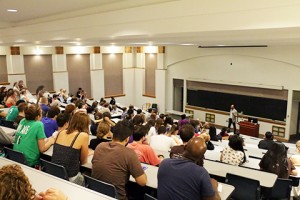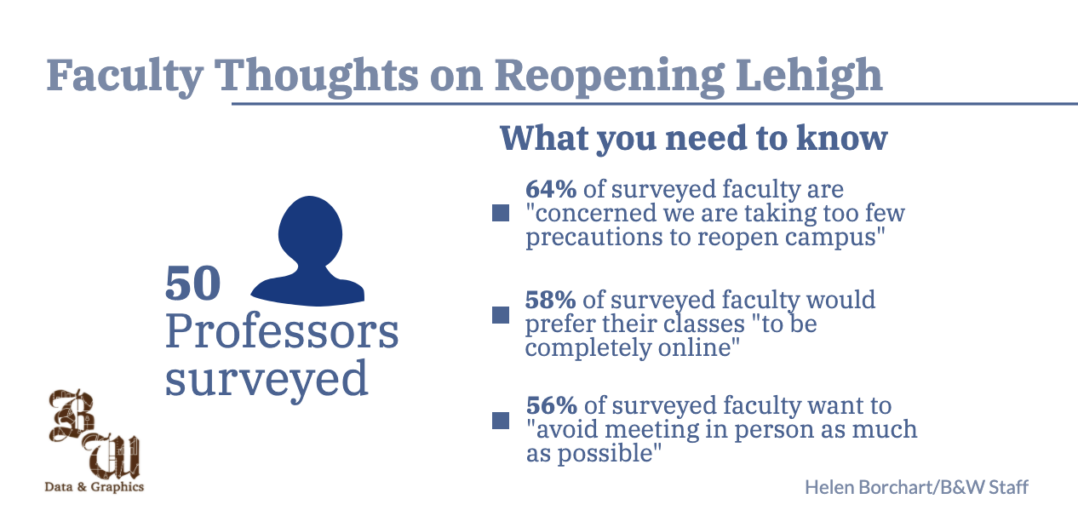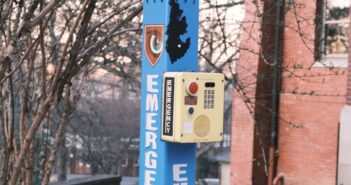Lehigh classes are starting Aug. 24 with a mix of in-person and online — but a new faculty-only survey shows professors are far from sold on the plans the university has put forth thus far.
Graphic by Helen Borchart and Jenna Simon/B&W Staff
In a Brown and White survey sent to professors in each of the five colleges, over 60 percent of respondents feel that the university is “taking too few precautions” in its plan to reopen campus. About 18 percent of respondents said they support the university’s plan “as it stands now.”
In addition to feeling ill prepared to return to in-person instruction in August, nearly 60 percent of respondents also said they prefer all their courses to be conducted remotely. And 56 percent said they “want to avoid meeting in person as much as possible.”
The survey, which was sent to a randomized list of professors from each college, asked faculty their thoughts on Lehigh’s current reopening plan, concerns they had pertaining to the plan and how they hope to hold classes in the fall.
The survey provided participants with the opportunity to further express their feelings regarding administration decisions, who should have a say in making decisions going forward and other thoughts they may have. The survey included responses from 50 professors.
Professors from the College of Health declined to participate in the survey.
While almost all respondents expressed their desire to teach their students face to face again, many said this was not feasible given the current health crisis.
Todd Watkins, a professor of economics, said he does not feel comfortable conducting his classes in person given the nature of college students and Lehigh’s limited ability to ensure that students will practice social distancing and other safety precautions enforced by the school.
Watkins said it “seems delusional to expect young people to consistently make choices that minimize community risk,” but praised the efforts of the administration and the Lehigh faculty as a whole for their continued efforts to create a return to normalcy as safely as possible.
He said the biggest problem is the “non-curricular” part of campus: residential life, extracurricular activities and social interactions. Even as well intentioned as Lehigh students are, Watkins said based on research about the risks young people take even while knowing the potential consequences, he doesn’t “have full faith” that they will make “the wisest choices.”
“Unquestionably, and without any hyperbole, the social experiment we are about to undertake risks lives,” Watkins said.
While many shared concerns regarding the return to in-person learning, a small minority of respondents — 10 percent — said they look forward to returning to the classroom and favor instruction being held entirely face to face .
Frank Gunter, a professor of economics, said he has no concerns regarding Lehigh’s current plans and looks forward to returning to the classroom.
“I think that there is a different dynamic to online teaching that may disadvantage some students,” Gunter said.
Steven Regen, a professor of chemistry, said he prefers his courses be taught completely online this semester. But for him, it’s academic integrity that concerns him the most if he must conduct his classes remotely instead.
“In terms of lecturing online, I don’t see a problem,” Regen said. “In fact, if recorded videos are used, the student has the option of hearing a lecture more than once, which is a good thing. In my opinion, the biggest problem with online courses are the exams. In the absence of adequate proctoring, the veracity and the ultimate value of online education could well be called into question.”

Large lectures, like the one seen here, will be essentially nonexistent this semester. Lehigh has said classes larger than 50 students will be entirely online due to the pandemic. (Nadine Elsayed/B&W photo)
The survey also revealed a clear split on who faculty think should be making decisions related to how instruction is delivered this semester.
Forty-eight percent of respondents said they believe only the individual professor should be responsible for “determining which classes meet in person and how often they do.” An equal 48 percent said a mix of the individual professor and the administration, which includes the Provost’s Office and Registration and Academic Services, should be responsible for determining the extent to which classes are held in person.
Lehigh has announced it is planning to welcome students back to campus in August under a hybrid model of learning. Every course, however, will include some remote learning. Classes with more than 50 students will be entirely online. Face coverings will need to be worn in all public spaces.
Any in-person instruction or activities will conclude at Thanksgiving break, meaning the last two weeks of classes and final exams will be held virtually. The university also told students, staff and faculty they will need to “complete training and acknowledge that they agree to uphold these community standards before returning to campus.”
The bottom line: this semester will be different. And it will be complicated.
Joshua Pepper, an associate professor of physics, said communication with the campus is “vital.”
“Both the faculty and administration are working very hard to plan and execute a massively complex teaching plan for the fall, while the administration’s planning is also coupled with planning for residential life, facilities, athletics and finances,” Pepper said.“There are going to be problems and setbacks, and we all need to be prepared to deal with them.”
Classes, though, are just one part of the puzzle to reopen campus. There are also questions related to tuition, housing, dining, health and safety and more.
Lehigh’s tuition, which was scheduled to increase 4 percent this academic year, is now up in the air. Pat Johnson, Lehigh’s vice president of Finance and Administration, has not yet decided on whether that planned increase — which amounts to over $2,000 — will remain. A number of universities have announced plans to freeze tuition as a result of the financial hardships brought by the pandemic.
Housing and dining — core pieces of the Lehigh residential experience — remain largely unknown despite the start of classes being six weeks away. Some students who planned to live in Greek chapter houses were forced to find alternative housing in recent weeks in order to meet social distancing guidelines. “Grab and go” dining options will be expanded this semester as well.
“There are going to be problems and setbacks, and we all need to be prepared to deal with them.”
–Joshua Pepper, associate professor in physics
The feeling of uncertainty only increased this past week as a result of the now-rescinded ICE policy announcement regarding international students. The policy, which stated that international students could not reside in the United States in the event their universities choose to hold classes only online, also required that students take a leave of absence from their universities if they need to leave the U.S.
But in a major reversal by the Trump administration — and a win for international students and universities alike — that policy has since been revoked. Lori Friedman, a Lehigh spokeswoman, said the university had joined the President’s Alliance on Higher Education and Immigration’s Amicus brief in support of the lawsuit filed by Harvard and MIT to oppose the ICE policy. Lehigh had 1,059 international students enrolled last year.
The policy had been announced around the same time that top universities said they will conduct the fall semester entirely or mostly online. Harvard, Princeton and Rutgers are some of those institutions.
Lehigh has also faced financial challenges since the pandemic began to ripple across the country. The university announced it is facing a $40 million budget shortfall and has furloughed certain workers as of July 1, along with a number of top administrators taking salary cuts and a hiring freeze. Faculty and staff also did not receive scheduled salary raises and the university will not be making contributions to faculty and staff retirement plans.
Matriculation from Lehigh’s recently admitted students remains uncertain. Lehigh saw more than 3,000 fewer applicants for the class of 2024 compared to the class of 2023, even while the university attempted to grow its student body under the Path to Prominence.
Other areas, however, are beginning to crystallize. The university has said housing and dining costs will remain unchanged from last year, despite Lehigh’s decision to end in-person activities at Thanksgiving — forcing students home two or three weeks earlier than usual.
The Patriot League recently announced the cancellation of fall sports this semester.
And the Health and Wellness Center also shared new guidance with The Brown and White. David Rubenstein, the Health Center’s executive director, said a second clinic will be opening this semester. He also said the Health Center will have the capacity to test symptomatic students for COVID-19.
As the university inches closer to its reopening, coronavirus cases are on the rise nationwide. The U.S. continues to break its own records for daily cases, and Pennsylvania has issued a travel advisory for individuals entering the state from one of 15 states where cases are surging. The U.S. has logged about 3.4 million COVID-19 cases and about 135,000 deaths, according to the Centers for Disease Control and Prevention.






Comment policy
Comments posted to The Brown and White website are reviewed by a moderator before being approved. Incendiary speech or harassing language, including comments targeted at individuals, may be deemed unacceptable and not published. Spam and other soliciting will also be declined.
The Brown and White also reserves the right to not publish entirely anonymous comments.
6 Comments
Of course they do poor babies. How bout a cut to 1/2 pay for doing 1/2 the job.
Do you go to the grocery store to shop?
If so, you are running more risk than teaching or attending a class with the existing protocols.
Enough with the angst – save it for the studies majors.
Not much of a “survey”. I believe the University has almost 700 professor, with about 545 full time. Misleading headline.
So, just to be clear, 29 faculty in your survey would prefer to teach entirely online. That is fine. 29 is not a significant percentage of the Lehigh faculty cohort, which is 540+ individuals. Your survey may not be representative of the full faculty. Reaching out to the faculty senate would get you a better picture of how the faculty are responding to the constantly changing sets of circumstances brought about by COVID-19.
If you want to teach remotely – then cut the tuition cost. You are not delivering an authentic Lehigh experience!
Lehigh Alum 1978
Now see what the student who are being charged outrageous amounts – even with the optional 10% cut – want!
(Hint, it’s not what the tenured, job-secure professors want.)